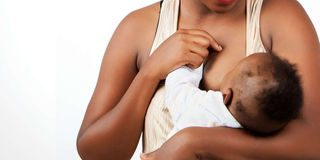Breastfeeding safe for mothers with Covid-19: Study

Pregnant women infected with Covid-19 should continue to breastfeed their babies, an expert has said. PHOTO | FOTOSEARCH
Pregnant women infected with Covid-19 should continue to breastfeed their babies, an expert has said.
Prof Ruth Nduati, a paeditrician and epidemiologist says breastfeeding provides even greater protection to the infants in addition to boosting their immunity at that tender stage.
Prof Nduati, a lecturer at University of Nairobi, was speaking to HealthyNation following a new study that indicates that pregnant mothers can pass the deadly disease to their babies during or around the delivery period.
A team of Chinese researchers and medics carried out the study on 33 pregnant women in Shanghai and Wuhan, China, who were infected with the novel coronavirus. “The clinical symptoms from 33 neonates with or at risk of Covid-19 were mild and outcomes were favourable,” reads the report published in the Journal of American Medical Association Paediatrics.
Of the 33 study participants, three of them passed the viral pneumonia to their babies.
The three infected babies, however, recovered after being put on treatment.
“It is too early to term the Chinese data authoritative on the matter. For new or improved delivery practices to come into effect, we need more research from other parts of the world on the possibility of mothers transmitting the disease to their unborn babies,” said Prof Nduati.
She said there was an ongoing debate in Johns Hopkins University School of Medicine on whether to separate a newborn from a mother with Covid19 or allow her to breastfeed the infant, but took the view that breastfeeding was the best option.
Respiratory disease expert, Dr Joseph Aluoch, said there was still no evidence to support the theory that Covid-19 could be passed from mothers to their babies while in the womb. “What we have seen are cases of aerosol or droplet-based transmission that occurred after the babies were born,” said Dr Aluoch. “For now, what expectant mothers and facilities should do is to ensure that there is no transmission at the delivery stage,” he added.
Researchers are yet to precisely explain why children seem to be less severely affected by Covid19 compared to adults. One theory is that children acquire and share other kinds of coronaviruses with similar but mild flu-like symptoms, which might make them less prone to the severe immune response caused by Sars-CoV-2 infection.
Another theory is that a baby’s immune system is too underdeveloped to display the extreme response seen in adults that could result in several complications and even death.
The study authors insist that screening of pregnant mothers is important if the war against Covid-19 is to be won in the delivery rooms of health facilities.
“It is crucial to screen pregnant women and implement strict infection control measures, quarantine of infected mothers, and close monitoring of neonates at risk of Covid-19,” the report said.
Despite the size of the study, Dr Neil Silverman who is a mother to child medicine specialist at the University of California, Los Angeles, said it had proved that pregnant women could still opt for vaginal birth instead of cesarean delivery as a way to avoid infecting babies with Covid-19.
“A newborn comes into contact with maternal body fluids through vaginal or caesarean section delivery. Then there is no reason to think that C-section would be particularly protective,” said Dr Silverman.


